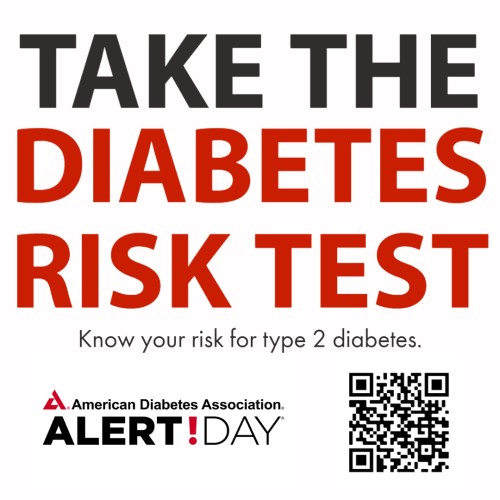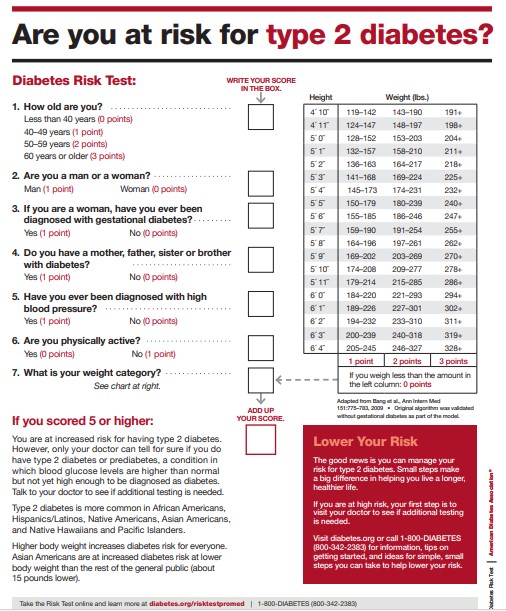
Special to Iredell Free News
Tuesday, March 23, is the American Diabetes Association Diabetes Alert Day.
With 7.2 million adults living in the United States who are unaware they have diabetes, Diabetes Alert Day encourages individuals to find out if they are at risk and how to reduce that risk.
The American Diabetes Association (ADA) created Diabetes Alert Day as a one-day “wake-up call,” inviting the public to take a Diabetes Risk Test to determine if they are at risk for developing diabetes. It is imperative to have an understanding of diabetes in order to recognize your risks early before it’s too late.
“Early detection of diabetes can have a very positive long-term impact on your quality of life,” said Amanda Downs, Registered Dietician at Iredell Health System’s Wellness and Diabetes Center.
What is diabetes?
Diabetes occurs when your body neither produces nor uses insulin effectively. Insulin is a hormone secreted by the pancreas that prevents sugar from building up in your blood, causing high blood sugar.
There are three main types of diabetes:
♦ Type 1 is an autoimmune disease that occurs when your body does not make enough insulin; and
♦ Type 2 diabetes happens when your body does not use insulin properly. Obesity, age, genetics, smoking, and an inactive, sedentary lifestyle can lead to insulin resistance and Type 2 diabetes.
♦ Gestational diabetes, occurs when your body does not use insulin properly during pregnancy.
According to Heather White, the Diabetes Program Manager of Iredell Health System’s Wellness and Diabetes Center, only 2 percent of individuals with gestational diabetes actually develop diabetes after pregnancy. However, this condition does put the baby at a higher risk of developing diabetes.
How do I know if I have diabetes?
According to White, symptoms of diabetes include increased thirst and urination, blurred vision, fatigue, confusion, numbness and tingling in your extremities, and high blood pressure that can make you feel shaky or dizzy.
In addition to recognizing your symptoms, White recommends taking a diabetes risk assessment test.
As part of Diabetes Alert Day, you can take the ADA’s 60-second Diabetes Risk Test to determine your risk for developing diabetes. To take the test, visit the ADA’s website and click on “Take Our Risk Test.”
“Early diagnosis of diabetes allows an individual to get proper treatment and gives them more time to make lifestyle changes. This will help them to manage their blood sugar and prevent long-term issues such as heart disease, stroke, eye, and kidney problems,” said Downs.
What complications are associated with diabetes?
“People who have diabetes are at a higher risk for heart disease, stroke, and blood vessel damage throughout their entire body from their eyes, to their kidneys, and even feet,” said White.
Diabetes and high blood sugar cause sugar to attach to your red blood cells, leading to long-term damage in your blood vessels’ inner walls. This damage causes scar tissue to form, which can provoke a heart attack or stroke. Short-term complications of diabetes include both low blood sugar and high blood sugar.
“If you are unaware that you have diabetes, you could have years and years of damage without ever knowing it. Then, when one day you get sick or have a problem, they find lots of underlying problems and complications as well,” said White.
What can I do?
If you have diabetes or are at risk of developing it, you can begin to make healthy lifestyle changes like exercising regularly and maintaining healthy eating habits. Iredell Health System’s Wellness and Diabetes Center encourages 30 minutes of “walking with a purpose” every day of the week. You can even split this into three intervals of 10 minutes throughout the day.
In addition to exercising, it is important to emphasize healthy eating. The Wellness and Diabetes Center can provide personalized meal plans according to an individual’s specific needs, preferences, and lifestyle.
“There is not a perfect meal plan. Each one is individualized, and there is no one-size-fits-all,” said Downs.
If you have diabetes, White recommends monitoring your blood sugar and knowing what your target value should be. According to ADA standards, your target blood sugar value should be between 70 and 130 in the morning and less than 180 two hours after eating. It is crucial to seek help from your primary care physician if you are concerned about your risks.
Want to know more?
If you would like to know more about Iredell Health System’s Wellness and Diabetes Center, you can ask your primary care physician for a referral or reach out to the center directly.
“Our goal is to empower and educate our patients so that they feel confident in managing their
diabetes,” said White.
The Wellness and Diabetes Center is also holding monthly, virtual diabetes support and education groups via Zoom. The virtual meetings will be held the fourth Wednesday of every month from 7 to 8 p.m. The next group meeting is Wednesday, March 24, and will cover healthy eating and carbohydrates.
These virtual support groups are free and open to the public. You do not have to be a patient to attend.
You can register for the virtual support group online at iredellhealth.org under the classes/events tab.

About Iredell Health System
Iredell Health System includes Iredell Memorial Hospital; Iredell Home Health; Iredell Wound Care & Hyperbaric Center; Community and Corporate Wellness; Occupational Medicine; the Iredell Physician Network and more. Iredell Memorial Hospital is the largest and only nonprofit hospital in Iredell County. The comprehensive healthcare facility has 247 beds; more than 1,700 employees; and has 260 physicians representing various specialties. Centers of excellence include Women’s and Children’s; Cardiovascular; Cancer; Surgical Services and Wellness & Prevention. The mission of Iredell Health System is to inspire wellbeing. For a comprehensive list of services and programs, visit www.iredellhealth.org.



